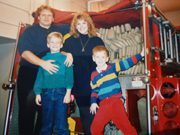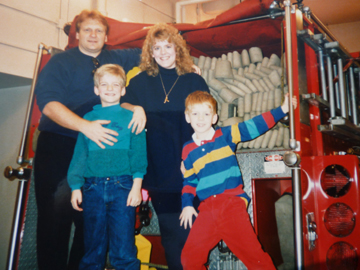
By Anne Gagliano
If you’re hoping to raise superstars, you’d be better off checking with the parents of Brett Favre or Beyoncé. If you are, however, just hoping to raise loving, emotionally stable, hard-working, respectful, decent kids who graduate from college, then read on. No superstars were produced in our home, but I must say, my husband Mike and I somehow managed to raise two fine young men who’ve turned out remarkably stable in the midst of the chaotic life of a firefighter. Our oldest son Michael is happily married, is a college graduate with a bachelor’s degree in chemistry, and has a terrific job as a computer services manager for the graduate department of Seattle Pacific University. Our youngest son Rick is in his second year of law school at George Mason University in Arlington, Virginia, and he has just landed an internship with a congressman there. Neither has ever been in any kind of trouble, and they never rebelled against us; we’ve always been close and still are.
So how did we do it? Some of it is just pure, dumb luck, some of it is simply who they are, and some small portion can be attributed to our parenting. Kids don’t come with a set of instructions, but we parents can always look to others for some advice. So I’ll share a few tips with you younger families that we actually did and that apparently worked:
1. Keep your kids on a regular schedule even though your firefighter is not. This one’s tough because firefighters keep chaotic hours that are generally in direct contrast with everyone else’s. Mike was often up all night and needed to try to sleep during the day while I struggled to keep little boys quiet. But what kept us sane and connected in the midst of these chaotic, conflicting hours was to be strict in two areas: bedtime and dinnertime. During the school years, I had the kids in bed at the same time each night whether Dad was there to tuck them in or not. Mike had one schedule, the kids had another, and I somehow lived in between the two. And when Daddy was home, we sat down to dinner together. I know too many families who never eat dinner together, and I think this is a tragedy, for sharing a meal is the perfect time to bond. Make it sacred, inviolate, for it’s a simple way of keeping in touch so as not to become as ships that pass in the day or night. We did; mealtime was honored all the way through, even during, the teen years. Bedtime and mealtime can be two cornerstones of stability for the firefighter children.
2. A work ethic must be taught by doing, not by observing. Anyone who knows my boys knows this: They each have an incredible work ethic. I do not believe this happens simply by parents’ example; in fact, the opposite seems to happen. I know a lot of hard-working firefighters who produce lazy, entitled children who seem to think that money falls off trees because their parents do everything and buy everything for them. We taught our kids to value work and to do for themselves from a very young age by giving them chore lists. I hand-wrote lists with actual “check boxes,” then photocopied them so I’d have a whole stack (this was before the days of home computers with printers.) As soon as my kids were old enough to read, they were given these lists of age-appropriate duties and shown how to complete them. The chores included feeding pets, hauling garbage (with help if needed), even bathing and reading books. (My little boys were not willing bathers.) I wanted them to learn to appreciate hygiene and reading, and the chore lists helped with this. When a completed chore list was turned in, they received an allowance–an award for hard work. The money was theirs to do with as they pleased. We never just gave our kids anything except on birthdays and holidays. If they wanted something, they had to earn it. They eventually outgrew the chore lists and kept mental note of their tasks, even adding more as they became stronger and more mature. By around age 12, they took on all the yard work, splitting the tasks between them as they chose; we let them work it out. At age 14, they expanded their earning potential by doing yard work and dog care for neighbors, extended family, and friends. In high school, they both landed afterschool jobs and made their own car payments, buying for themselves their own vehicles. They also worked during their junior and senior years of college, paying their own bills when they lived off-campus. (We didn’t want them to work their freshman and sophomore years because we felt that simply adjusting to college life was enough at first.) We told our kids that we were a team, that each of us had to do our part if we were to make it as a family. They had something to contribute, and we as their parents needed them to help. And the way we made them want to help was by rewarding them with an allowance, with praise, with appreciation, and with respect.
3. Pets help kids become caring, tender-hearted people with a keener respect for life. We all know that firefighters face death–the death of others and even the threat of death for themselves. This reality of firefighting is something we parents strive to shield our children from, and rightfully so. We don’t want our little ones to have panic attacks every time their firefighter parent heads to work. Yet, at the same time, we want our kids to know a little of death so they can not only be a bit better prepared if the worst should happen, but also appreciate the value of life. Enter a pet. A pet is a good safe place to start on this topic. We love our pets, but they’re not human, so it’s a gradual stepping-stone along this path. The first creatures to enter our home were bugs and frogs–great place to start when learning of life and death for they don’t live long, yet they can still be appreciated while they last. Then we got our little boys guinea pigs. They loved these simple, silly creatures and learned how to care for them (with my supervision, of course.) We even let our pigs breed, and this was another great life lesson. Guinea pigs don’t live very long, either, but this is the tragedy of pets: We love them, we lose them, we bury them, then life goes on. Next, we got a puppy, and our boys grasped an even deeper sense of attachment that was both incredible and heartbreaking. Our family dogs have come and gone (one was even hit by a car), but we believe our affection for these four-legged family members has enriched our boys’ lives by giving them tender hearts, deeper character, and a better understanding of what their father does for a living—he tries to preserve life.
In my next column, I will continue with more of my 10 tips for firefighter parents that will include how to create good students, the impact of peers, and helping your children have high self-esteem by finding their hidden talents.
Anne Gagliano has been married to Captain Mike Gagliano of the Seattle (WA) Fire Department for 27 years. She and her husband lecture together on building and maintaining a strong marriage.

